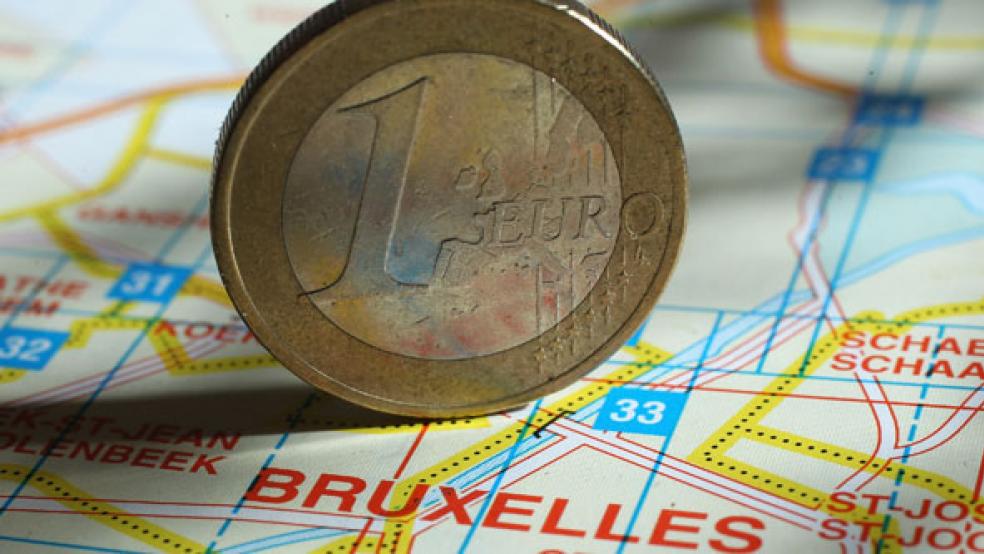The opening last week in northeastern Spain of a 37-million-euro stretch of motorway to nowhere is an irresistible metaphor for the euro, an ambitious project conceived in better times that is now seemingly running out of road. With Spain heavily in debt, the authorities could not afford to finish the highway but opened the completed 6 km section near Lleida in any case to deter illegal joy racing.

If only the euro were bringing joy. Maybe the road in Spain will be completed one day, but for now it is one more reminder that much of Europe has been living beyond its means.
On this score, the euro's woes are largely irrelevant. Europe would have to pull up its socks with or without the single currency. The really big challenges to Europe's standard of living come from globalization, technological change and aging populations.
Put differently, if Europe wants first-class infrastructure and a comprehensive welfare state without piling up ever more debt, governments need to shake up working habits to generate the growth that spins off tax revenues. Yet Europe's response, with policymakers preoccupied by the festering currency crisis, has been tardy. All the while, the rest of the world, especially Asia, has been marching on.
RELATED: The Eurozone's Biggest Challenge: Fear and Panic
Douglas Roberts, chief international economist at Standard Life Investments in Edinburgh, said it was no wonder that the United States exports more than twice as much to emerging markets as it does to sclerotic Europe. "Even if Europe were firing on all cylinders, it would be one of the slowest growing regions in the world," he said.
PINCER MOVEMENT
The rise of China and India, of Brazil and Turkey, deals a double blow to Europe. They can manufacture more cheaply, signing the death warrant of many labor-intensive industries in Europe and keeping a lid on wages. Yet, through their thirst for energy and raw materials, emerging markets raise the continent's input costs.
The result is a compression of real incomes that Europe - and the United States - was able to hide for a long time by racking up debt. No longer.
Andy Xie, an independent economist in China, said European countries without a competitive advantage must simply work harder or spend less. Alternatively, if they want to keep living it up, they will have to accept wrenching labor reforms and deregulation.
Xie saw no popular consent for either course of action. Nor did he detect that Europe was tightening its belt as urgently as Asia did after its 1997/98 financial crisis. "While eurozone economies have contracted a bit, people seem to be bent on enjoying life as usual," Xie wrote in New Century weekly, a Chinese publication. "China cannot save Europe. No one can. Only Europeans can, through increasing work relative to leisure."
Germany deserves an exemption from Xie's strictures. Sweeping changes to free up the labor market, combined with wage restraint, have helped drive unemployment down to 20-year lows. Germany's youth jobless rate of 7.9 percent in March was the lowest of the European Union's 27 members and a fraction of the rate in Greece and Spain, which has jumped to more than 51 percent.
This surge has been caused in part by budget cuts required by the euro crisis. But Marc Chandler, an economist with Brown Brothers Harriman in New York, said globalization would have squeezed the less sophisticated economies on the southern fringes of Europe in any event. "The rise of China and emerging markets more generally have challenged unskilled labor around the world, not just in the periphery of Europe, but in the U.S. and UK too," he said in a report.
MUST DO BETTER
The challenge is one that the West is struggling to meet. Computers have compounded the "China effect" by eliminating swathes of traditional jobs, from bank tellers to lathe operators. Knowledge-intensive services have boomed at the same time, putting a premium on up-to-date skills.
But a report from the Organisation for Economic Cooperation and Development, a Paris forum of industrial democracies, says one in five young people leave school without completing even upper secondary education. And adults all too often do not get help in retraining. "We don't yet have this culture of investing in people through their life cycle," said Andreas Schleicher, the coordinator of the OECD's skills strategy.
Take Britain, which, like the United States, has stubbornly high unemployment with youth jobless rates above 20 percent. Paul Sissons with the Work Foundation, a think tank in London, said only 8 percent of Britons aged 16-24 worked in manufacturing in 2011, down from 24 percent in 1981. Services had taken up the slack, but youngsters were not being equipped with the requisite skills such as communications and team working. "For young people without the soft skills needed to access work in these growing sectors, finding employment has become increasingly difficult," Sissons said.
EUROPE GROWS OLD
Another set of problems that Europe would be confronting with or without the euro has to do with rapid aging. The euro zone crisis has at least had the virtue of forcing politicians to propose ways of tackling ever-rising bills for pensions and age-related health care.
"We are in the midst of a huge demographic transition which compounds the debt crisis due to its impact on population pyramids, on growth rates and on what is sustainable and stable in the longer run in terms of public spending," said Edward Hugh, an economist who lives near Barcelona. He said politicians were needed with the courage to admit that, as Europe turns grey, public spending in the long run had to be reined in.
"Spaniards have been led to expect world class health care, and while this was possible during the boom years, it isn't now, given the economic slump and the growing demographic headwinds," Hugh said on his blog.




